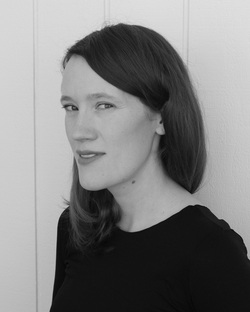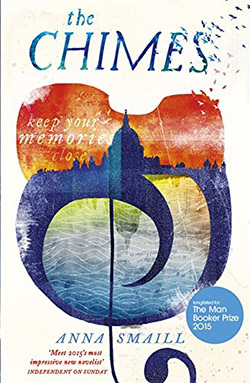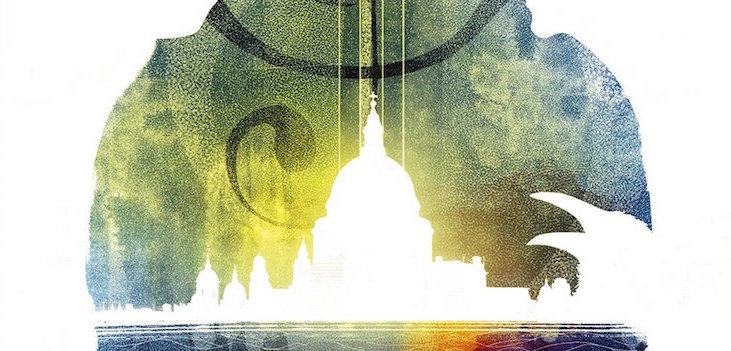A couple of weeks ago, if you’d said you hadn’t read any Anna Smaill, I’d have been sad, but not entirely surprised. Long story short, she’s the author of a book of poetry, namely The Violinist in Spring, and a novel, first released in February 2015, called The Chimes.
Now I loved that novel—“to call The Chimes striking is I dare say to underplay what might be the most distinctive debut of the decade” is how I put it in my rave of a review—but I’ve loved any number of novels during my time here at Tor.com, and I don’t actually expect you to act on my every recommendation. To wit: if, a fortnight or so ago, you hadn’t quite gotten around to The Chimes, that would have been fine. Not so much now that it’s went and won the World Fantasy Award, beating out some truly brilliant books by Kazuo Ishiguro, N. K. Jemisin, Naomi Novik, K. J. Parker, and Paul Tremblay; now you really do need to read it.
In the wake of her win, I spoke with Anna Smaill about memory, legacy, genre, music and community. Our conversation follows.
Niall Alexander: “To have won is utterly unexpected, utterly invigorating, and truly humbling,” you said in your acceptance speech. I’m going to go out a limb here and guess that you really weren’t expecting this, were you?
Anna Smaill: No, not at all. I really really didn’t see it coming. It’s probably in part because I was quite far away from the reality of the award—sitting in my office at Victoria Uni in Wellington, in a different time zone, marking student essays. I think it’s also—whatever this says about me—easier for me to imagine not winning than it is to imagine winning. It’s less of an imaginative leap in the first instance: like most people, I have more experience in the former. But it’s also probably out of a lazy desire to avoid disappointment.
NA: In that same speech, you thanked the attendees of the convention in addition to the judges. It may go without saying, but why, exactly?
AS: Well, more than many other literary awards, it seems as though the World Fantasy Award is sustained and supported by a community of readers and enthusiasts. The award wouldn’t exist without the convention. The shortlist is initially drawn up from votes cast by both judges and present and past attendees. Whether The Chimes found its way via the attendees’ or the judges’ ballots, I’m not sure, but it seemed right to thank the people who’d made it possible. I don’t know the community well at all, but this says more about me. I live on the other side of the world from the larger readership, and am an introvert who rarely talks about writing or reading apart from with my students, my husband, and a handful of close friends.
 NA: Looking through the list of past World Fantasy Award winners, all of a sudden you’re keeping some incredible—and incredibly speculative—company. Anna Smaill can now be cited in the same sentence as, for example, Jack Vance, Gene Wolfe, Michael Moorcock and Haruki Murakami: giants of the genre all. How does that sit with you?
NA: Looking through the list of past World Fantasy Award winners, all of a sudden you’re keeping some incredible—and incredibly speculative—company. Anna Smaill can now be cited in the same sentence as, for example, Jack Vance, Gene Wolfe, Michael Moorcock and Haruki Murakami: giants of the genre all. How does that sit with you?
AS: [The Chimes] is my first novel and I’m still working out the kind of writer I am and want to be. Because of this, I don’t feel entirely comfortable taking my place in that sentence, or that pantheon, yet. The award is more than an encouragement, though, it’s a wonderful burst of energy, and a high incentive to improve. I really do feel I’ll be able to take strength from it. Some of the writers on that list—particularly Le Guin, John Crowley and Margo Lanagan—have been incredibly important to me as a reader, as well as a writer. Being connected to them by this thread feels like having some sort of genetic heritage confirmed. It’s like a private familial bond has been added to some of those imagined literary relationships.
NA: Earlier this year, The Chimes was also longlisted for the Man Booker Prize, which might be one of the most literary awards there is. And the literary establishment is sometimes… let’s just say a little sniffy about genre fiction. Now that you’ve gone and won a genre fiction award, are you concerned at all about being boxed in?
AS: No, not really. If anything it’s made me feel incredibly hopeful that the book can bridge both spheres. It seems that the World Fantasy Award in particular has a great history for flexibility and breadth in straddling genre and literary boundaries. I suppose one risks being boxed in in terms of marketing, but I think all books face this challenge. I’m also incredibly lucky to have a publisher, in Sceptre, who sees expansive possibilities in the gaps between genre. They have a brilliant precedent in David Mitchell. One of the things I was most proud about in terms of The Chimes’ fortunes is that, by being longlisted for the Man Booker and winning the World Fantasy Award, it followed in the footsteps of The Bone Clocks.
NA: So you see The Chimes as fantasy, and yourself as an author of fantastic fiction?
AS: Yes, The Chimes is fantasy. I’d hope to call myself an author of fantastic fiction. But, I’m still always a little tenuous on the connections between reality and fantasy anyway. The imaginative space I’m most interested in is the grey area between ‘fantasy’ worlds, and the real or physically verifiable. I don’t think this is going to change—I’ve tried writing more firmly in one or the other accepted reality, but it’s the grey area that pulls me.
I don’t simply mean the grey area between genre and literary fiction, or the idea of mixed genre or hybrid genre, I mean the gap between the things that are observable or empirically ‘true’, and the drives of story and imagination that push us to deeper places. It’s a gap that opens up in both individual as well as social experience. It also continues to make a deep sort of sense to me that the most interesting and challenging psychological states or philosophical questions can’t necessarily be expressed or realised via straight-up mutually assured realism.
 One of the most interesting things about the genre debate is the double standards we bring to poetry and prose. Before writing my first novel, I was reading and writing far more poetry than fiction. It’s enduringly strange—we never blink when extraordinary, fantastic or improbable things occur in poetry. We accept these occurrences as metaphorical leaps, as reflections of internal states, as moments of aesthetic speculation. And we never treat the poetry that results as somehow lacking in seriousness or humanity or literary importance. Writers like James Tate, Bill Manhire, Elizabeth Bishop, they’re constantly probing philosophical and psychological weirdness, as well as just having a fine time playing around with strange ideas. It seems like a very basic claim that fiction should enjoy the same privilege.
One of the most interesting things about the genre debate is the double standards we bring to poetry and prose. Before writing my first novel, I was reading and writing far more poetry than fiction. It’s enduringly strange—we never blink when extraordinary, fantastic or improbable things occur in poetry. We accept these occurrences as metaphorical leaps, as reflections of internal states, as moments of aesthetic speculation. And we never treat the poetry that results as somehow lacking in seriousness or humanity or literary importance. Writers like James Tate, Bill Manhire, Elizabeth Bishop, they’re constantly probing philosophical and psychological weirdness, as well as just having a fine time playing around with strange ideas. It seems like a very basic claim that fiction should enjoy the same privilege.
NA: To change tack a touch, The Chimes is, perhaps above all else, a book about memory, so what memories do you have of writing it?
AS: In spite of the numerous difficulties in writing the novel, I now remember it with rose-tinted pleasure, as being entirely effortless throughout. This is because I’m now immersed in the challenges of the second novel, I guess. But I particularly loved the early stages, because I was writing in almost complete secrecy. I don’t know what it says about me, but I find that a very generative state. I’d go to the British Library, where I used to work as a student, and instead of reading, I’d write. I remember walking home feeling as though the city was shifting and reconfiguring around me.
It’s easier to discuss a book in terms of concepts in hindsight; really I was writing myself into an atmosphere. I wanted to capture the way London felt at different moments—the textures, the psychic layers in it. The chill of history, the violence as well as the curmudgeonliness, the grace and kindness of people, the beauty.
NA: Music also played a huge part in the book. Has it played a similarly huge part in your life, too?
AS: Yes, music was a very big part of my life. I say that in the past tense, because it does feel like I underwent a divorce from it. I spent most of my teens playing the violin quite seriously, as well as continually struggling with whether I was ‘musical’ enough to become a professional musician. I loved it and hated it, depending on the answer I arrived at on any given day. The answer also very often seemed to determine my own sense of self-love or -loathing. When music felt like an expressive channel it felt wonderful. When it was blocked by doubt or inability, it felt horrible. In the end, I stopped playing. In hindsight this was the right decision, but it was difficult at the time. I think most of my writing since has been an attempt to find my way back to the intensity of playing the violin—the sense of transcendence and freedom when it’s going well, as well as the discipline and rigour of having a daily practice. I’m still working it out. I think The Chimes happened onto a certain emotional honesty about these feelings, and I hope this is why it connected with people. But, you never really know.
Niall Alexander is an extra-curricular English teacher who reads and writes about all things weird and wonderful for The Speculative Scotsman, Strange Horizons, and Tor.com. He lives with about a bazillion books, his better half and a certain sleekit wee beastie in the central belt of bonnie Scotland.










